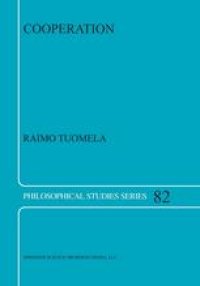
Ebook: Cooperation: A Philosophical Study
Author: Raimo Tuomela (auth.)
- Tags: Philosophy of Mind, Philosophy, Artificial Intelligence (incl. Robotics), Operation Research/Decision Theory, Personality and Social Psychology
- Series: Philosophical Studies Series 82
- Year: 2000
- Publisher: Springer Netherlands
- Edition: 1
- Language: English
- pdf
In Cooperation, A Philosophical Study, Tuomela offers the first comprehensive philosophical theory of cooperation. He builds on such notions a collective and joint goals, mutual beliefs, collective commitments, acting together and acting collectively. The book analyzes the varieties of cooperation, making use of the crucial distinction between group-mode and individual-mode cooperation. The former is based on collective goals and collective commitments, the latter on private goals and commitments. The book discusses the attitudes and the kinds of practical reasoning that cooperation requires and investigate some of the conditions under which cooperation is likely, rationally, to occur. It also shows some of the drawbacks of the standard game-theoretical treatments of cooperation and presents a survey of cooperation research in neighbouring fields.
Readership: Essential reading for researchers and graduate students in philosophy. Also of interest to researchers int he social sciences and AI.
In Cooperation, A Philosophical Study, Tuomela offers the first comprehensive philosophical theory of cooperation. He builds on such notions a collective and joint goals, mutual beliefs, collective commitments, acting together and acting collectively. The book analyzes the varieties of cooperation, making use of the crucial distinction between group-mode and individual-mode cooperation. The former is based on collective goals and collective commitments, the latter on private goals and commitments. The book discusses the attitudes and the kinds of practical reasoning that cooperation requires and investigate some of the conditions under which cooperation is likely, rationally, to occur. It also shows some of the drawbacks of the standard game-theoretical treatments of cooperation and presents a survey of cooperation research in neighbouring fields.
Readership: Essential reading for researchers and graduate students in philosophy. Also of interest to researchers int he social sciences and AI.
In Cooperation, A Philosophical Study, Tuomela offers the first comprehensive philosophical theory of cooperation. He builds on such notions a collective and joint goals, mutual beliefs, collective commitments, acting together and acting collectively. The book analyzes the varieties of cooperation, making use of the crucial distinction between group-mode and individual-mode cooperation. The former is based on collective goals and collective commitments, the latter on private goals and commitments. The book discusses the attitudes and the kinds of practical reasoning that cooperation requires and investigate some of the conditions under which cooperation is likely, rationally, to occur. It also shows some of the drawbacks of the standard game-theoretical treatments of cooperation and presents a survey of cooperation research in neighbouring fields.
Readership: Essential reading for researchers and graduate students in philosophy. Also of interest to researchers int he social sciences and AI.
Content:
Front Matter....Pages i-xiii
Introducing Social Action and Cooperation....Pages 1-25
Collective and Joint Goals....Pages 26-71
Cooperative Joint Action....Pages 72-107
Cooperation and Collective Goals....Pages 108-140
Cooperation, Practical Reasoning, and Communication....Pages 141-164
Cooperation in Institutional Context....Pages 165-194
Cooperation and Cooperative Game Theory....Pages 195-211
The Components of Social Control and Dependence....Pages 212-231
Cooperation and Preferences....Pages 232-255
Cooperation and the Dilemma of Collective Action....Pages 256-297
Rational Cooperation and Collective Reasons....Pages 298-340
Long-Term Cooperation....Pages 341-367
Conclusion....Pages 368-379
Back Matter....Pages 380-436
In Cooperation, A Philosophical Study, Tuomela offers the first comprehensive philosophical theory of cooperation. He builds on such notions a collective and joint goals, mutual beliefs, collective commitments, acting together and acting collectively. The book analyzes the varieties of cooperation, making use of the crucial distinction between group-mode and individual-mode cooperation. The former is based on collective goals and collective commitments, the latter on private goals and commitments. The book discusses the attitudes and the kinds of practical reasoning that cooperation requires and investigate some of the conditions under which cooperation is likely, rationally, to occur. It also shows some of the drawbacks of the standard game-theoretical treatments of cooperation and presents a survey of cooperation research in neighbouring fields.
Readership: Essential reading for researchers and graduate students in philosophy. Also of interest to researchers int he social sciences and AI.
Content:
Front Matter....Pages i-xiii
Introducing Social Action and Cooperation....Pages 1-25
Collective and Joint Goals....Pages 26-71
Cooperative Joint Action....Pages 72-107
Cooperation and Collective Goals....Pages 108-140
Cooperation, Practical Reasoning, and Communication....Pages 141-164
Cooperation in Institutional Context....Pages 165-194
Cooperation and Cooperative Game Theory....Pages 195-211
The Components of Social Control and Dependence....Pages 212-231
Cooperation and Preferences....Pages 232-255
Cooperation and the Dilemma of Collective Action....Pages 256-297
Rational Cooperation and Collective Reasons....Pages 298-340
Long-Term Cooperation....Pages 341-367
Conclusion....Pages 368-379
Back Matter....Pages 380-436
....